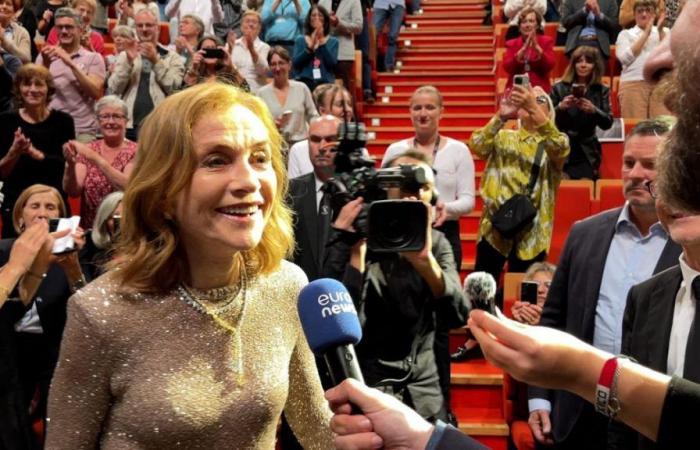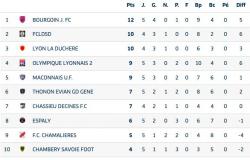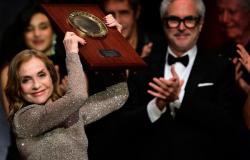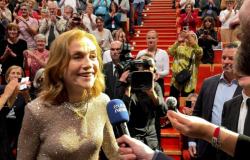
Isabelle Huppert received the coveted Lumière Prize. Euronews Culture attended the ceremony, as well as its masterclass. Here are the 10 things that struck us the most.
ADVERTISEMENT
On the occasion of the 15th anniversary of the Lumière Festival, Isabelle Huppert received the prestigious Lumière Prize during the traditional awards ceremony which took place Friday evening at the Amphithéâtre 3000 in Lyon.
In front of an audience including Alfonso Cuarón, Claire Denis, Noémie Merlant, Anthony Delon, James Franco, Emmanuelle Béart and Julien Clerc (who took the stage to perform his famous song “Ma Préférence” in honor of the star of the evening), Huppert took the stage to receive her award. She thus joins an illustrious list of winners of the prestigious Lumière prize, including Wim WendersMartin Scorsese, Tim BurtonJane Fonda, Quentin Tarantino, Jane CampionPedro Almodóvar and Wong Kar-wai.
“I was told that the Lumière prize was special, but it is much more than I could have imagined, and yet I have a lot of imagination,” she admitted, visibly moved and evoking the honor of receiving an award so closely linked to the history of cinema.
Speaking about the past and the future, she finally emphasized the importance of the present, “this joyful, wonderful and emotional moment.”
Before the awards ceremony, Huppert participated in a masterclass, a rare exercise for the actress, who doesn’t like to talk too much about her work and career in public.
The conversation took place with Thierry Frémaux, boss of the Lumière festival and head of the Cannes Film Festival, in the presence of Claire Denis and François Ozon, who both directed Huppert in White Material et Eight Womenrespectively, as well as Coralie Fargeat (The Substance) and Anthony Delon, seated in the audience. She has spoken openly and frankly about her career.
Here are the 10 things that caught our attention during this masterclass:
Cinema buff?
Ms. Huppert revealed that before starting her acting career, she had seen few films.
“That’s still the case today. At the time, we didn’t go to the cinema a lot. I should come back more often to Lyon and the festival“, she jokes.
Choice of films
Huppert has worked with some of the most renowned and international directors, from Bertrand Tavernier, Claire Denis, Werner Schroeter, Michael Haneke, Joachim Trier, to Hong Sang-soo, Paul Verhoeven, Wes Anderson and Ira Sachs, to name a few. mention just a few.
“I don’t know if I can read scripts, but maybe I can recognize the filmmakers and that obviously matters in the choices we make,” she said. “The choices are difficult, even mysterious. It’s a mixture of many things. In the end, it’s pure intuition.”
She also revealed that when she read scripts, she would make up her mind based on a line that stuck in her head. For example, in The PianistMichael Haneke’s 2001 erotic psychological drama, she focused on Erika’s line to her young student: “Coldness, that tells you something ?”
About it…
Restraint at all costs
Huppert doesn’t have a reputation for being the warmest on screen, with her roles often being characterized as cold, distant, or even emotionally distant.
But that’s on purpose.
Referring to this quote from The Pianistshe said it “sums up everything it means to be an actor.”
“It may seem surprising, but when people think of acting, they think of feelings, so of sentimentality, of something rounder. But when you act, you are in a certain coldness,” he said. -she declared. “When (her character, Erika) sees the young man playing, she understands that his way of playing will probably be his way of loving, something that does not do justice to the beauty of the music and therefore the feeling. I believe that It’s the same thing when you’re acting: you have to be detached from what you’re playing to be a better actor.”
“I like to approach each character I play with a certain distance, which often allows us to place humor in moments and roles where we least expect it. The Pianist is not really a comedy, to say the least, but there are funny aspects…”
Speaking of Haneke…
Failures
Huppert almost never worked with the famous Austrian filmmaker.
“We missed each other constantly,” she says. He first asked me to play in “Funny Games” and I decided not to do it. The film is extraordinary, but I found that it left no room for the imagination of the actress that I was. For me, the film was like a scientific and clinical demonstration of how violence operates on the spectator and how the spectator is the toy of this staging.”
After Funny GamesHaneke offered her two other films which she was unable to make. When he proposed The Pianistan ultimatum was given.
“He told me, ‘If you don’t want to do it, it’s over, I won’t offer you another film,'” Huppert says. For that reason, I said, ‘Yes, of course, I I’m going to do it! And then, I actually read the script while I was on the plane! The next minute I was landing at Vienna airport (for filming).”
Huppert later played for Haneke in The Time of the Wolf (2003), Amour (2012) et Happy End (2017). A happy ending, indeed.
“Do you think you can bring Haneke out of retirement?” Fremaux asks.
“Not sure,” she replies.
The perfect soldier on set?
When asked if she did what she was told on set, Huppert replied diplomatically, but with a wink: “Yes, if the movie goes as planned.”
“When you say “yes” to a project, several stories begin. I was lucky to meet directors who allowed me to tell stories between me and me.”
When asked if there had been any conflicts on set, Huppert said she hadn’t had any on a personal level, but had witnessed them – quoting French director Maurice Pialat .
“Conflict can be a means of dialogue and it can also be interesting. Making a film is difficult, and making a dream come true is not easy. Conflict is part of life.”
She then added: “The whole history of cinema, painting and literature is made of this – this is why we make films, it is both a great mystery and a blessing… It There are people who like it and others who don’t like it. I don’t think we make films to please everyone. And that’s good. The hegemonic fantasy is not good. We all see where this can lead…”
Self-deprecation and confessions
Throughout the masterclass, Isabelle Huppert was very frank and self-deprecating about the projects in which she starred, which “I’m sure no one has seen”.
She notably mentioned her role in the thriller Rosebuddirected by Otto Preminger in 1975. The film was originally to star Robert Mitchum, who abandoned the project due to disagreements with Preminger. In fact, it was because of Mitchum’s excessive drinking and the fact that Mitchum told Huppert, “I didn’t give a damn about the movies anymore.”
This saddened Huppert, who shared the anecdote that Mitchum had turned him on to an artist he was listening to at the time: Kris Kristofferson, died at the beginning of the year.
Huppert later starred alongside Kristofferson in the epic western Heaven’s Gate by Michael Cimino, which was infamously criticized and became even more infamous as a film that not only caused financial damage to the studios due to its budgetary costs, but had a wider effect on the film industry American as a warning to studios regarding arthouse films.
“At least I was able to tell Kris Kristofferson that he was Robert Mitchum’s favorite singer on the set of Heaven’s Gate !
On misogyny
“Misogyny doesn’t just exist in cinema, it’s everywhere. I learned to see it and recognize it. It has never hindered my work as an actress.”
Stairs, not elevators
About her career, Ms. Huppert said she is not afraid to take on roles that require her to move away from home or out of her comfort zone.
When asked if she has ever been abroad on a shoot and found herself in her hotel room at the end of the day wondering what she was doing here, she replies: “I love being in hotels – it’s definitely not the worst part of my job! As long as I can get to my room by stairs and not the elevator.”
In fact, Huppert confirmed that she had a phobia of elevators.
“I’m afraid of elevators, but not of the unknown.”
His favorite books
Huppert said she doesn’t like to reveal too much about her personal life, and that includes her favorite books or those that shaped her.
“Tell me what you read, I’ll tell you who you are… Where’s the fun in that?”
However, she revealed…
Did you know?
A spectator randomly asked Huppert what her favorite flowers were.
“Roses.”
Now you know.
The Lumière festival ends on October 20.





